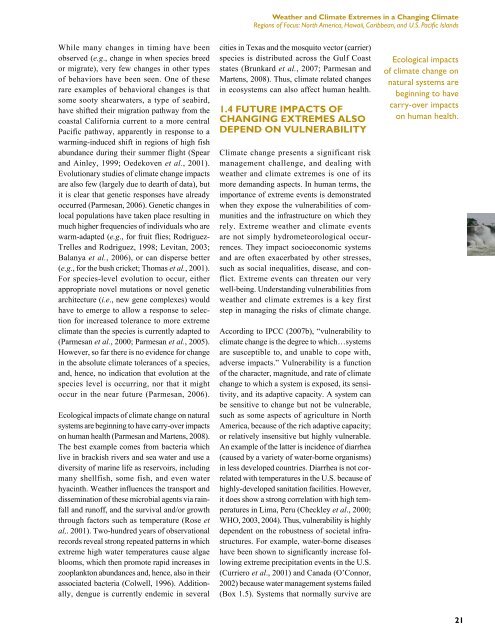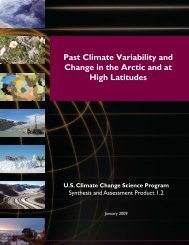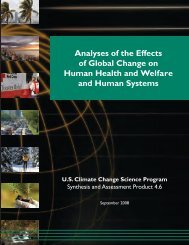Weather and Climate Extremes in a Changing Climate. Regions of ...
Weather and Climate Extremes in a Changing Climate. Regions of ...
Weather and Climate Extremes in a Changing Climate. Regions of ...
Create successful ePaper yourself
Turn your PDF publications into a flip-book with our unique Google optimized e-Paper software.
While many changes <strong>in</strong> tim<strong>in</strong>g have been<br />
observed (e.g., change <strong>in</strong> when species breed<br />
or migrate), very few changes <strong>in</strong> other types<br />
<strong>of</strong> behaviors have been seen. One <strong>of</strong> these<br />
rare examples <strong>of</strong> behavioral changes is that<br />
some sooty shearwaters, a type <strong>of</strong> seabird,<br />
have shifted their migration pathway from the<br />
coastal California current to a more central<br />
Pacific pathway, apparently <strong>in</strong> response to a<br />
warm<strong>in</strong>g-<strong>in</strong>duced shift <strong>in</strong> regions <strong>of</strong> high fish<br />
abundance dur<strong>in</strong>g their summer flight (Spear<br />
<strong>and</strong> A<strong>in</strong>ley, 1999; Oedekoven et al., 2001).<br />
Evolutionary studies <strong>of</strong> climate change impacts<br />
are also few (largely due to dearth <strong>of</strong> data), but<br />
it is clear that genetic responses have already<br />
occurred (Parmesan, 2006). Genetic changes <strong>in</strong><br />
local populations have taken place result<strong>in</strong>g <strong>in</strong><br />
much higher frequencies <strong>of</strong> <strong>in</strong>dividuals who are<br />
warm-adapted (e.g., for fruit flies; Rodriguez-<br />
Trelles <strong>and</strong> Rodriguez, 1998; Levitan, 2003;<br />
Balanya et al., 2006), or can disperse better<br />
(e.g., for the bush cricket; Thomas et al., 2001).<br />
For species-level evolution to occur, either<br />
appropriate novel mutations or novel genetic<br />
architecture (i.e., new gene complexes) would<br />
have to emerge to allow a response to selection<br />
for <strong>in</strong>creased tolerance to more extreme<br />
climate than the species is currently adapted to<br />
(Parmesan et al., 2000; Parmesan et al., 2005).<br />
However, so far there is no evidence for change<br />
<strong>in</strong> the absolute climate tolerances <strong>of</strong> a species,<br />
<strong>and</strong>, hence, no <strong>in</strong>dication that evolution at the<br />
species level is occurr<strong>in</strong>g, nor that it might<br />
occur <strong>in</strong> the near future (Parmesan, 2006).<br />
Ecological impacts <strong>of</strong> climate change on natural<br />
systems are beg<strong>in</strong>n<strong>in</strong>g to have carry-over impacts<br />
on human health (Parmesan <strong>and</strong> Martens, 2008).<br />
The best example comes from bacteria which<br />
live <strong>in</strong> brackish rivers <strong>and</strong> sea water <strong>and</strong> use a<br />
diversity <strong>of</strong> mar<strong>in</strong>e life as reservoirs, <strong>in</strong>clud<strong>in</strong>g<br />
many shellfish, some fish, <strong>and</strong> even water<br />
hyac<strong>in</strong>th. <strong>Weather</strong> <strong>in</strong>fluences the transport <strong>and</strong><br />
dissem<strong>in</strong>ation <strong>of</strong> these microbial agents via ra<strong>in</strong>fall<br />
<strong>and</strong> run<strong>of</strong>f, <strong>and</strong> the survival <strong>and</strong>/or growth<br />
through factors such as temperature (Rose et<br />
al,. 2001). Two-hundred years <strong>of</strong> observational<br />
records reveal strong repeated patterns <strong>in</strong> which<br />
extreme high water temperatures cause algae<br />
blooms, which then promote rapid <strong>in</strong>creases <strong>in</strong><br />
zooplankton abundances <strong>and</strong>, hence, also <strong>in</strong> their<br />
associated bacteria (Colwell, 1996). Additionally,<br />
dengue is currently endemic <strong>in</strong> several<br />
<strong>Weather</strong> <strong>and</strong> <strong>Climate</strong> <strong>Extremes</strong> <strong>in</strong> a Chang<strong>in</strong>g <strong>Climate</strong><br />
<strong>Regions</strong> <strong>of</strong> Focus: North America, Hawaii, Caribbean, <strong>and</strong> U.S. Pacific Isl<strong>and</strong>s<br />
cities <strong>in</strong> Texas <strong>and</strong> the mosquito vector (carrier)<br />
species is distributed across the Gulf Coast<br />
states (Brunkard et al., 2007; Parmesan <strong>and</strong><br />
Martens, 2008). Thus, climate related changes<br />
<strong>in</strong> ecosystems can also affect human health.<br />
1.4 fUTURE IMPACTS Of<br />
ChANgINg ExTREMES AlSO<br />
DEPEND ON VUlNERAbIlITY<br />
<strong>Climate</strong> change presents a significant risk<br />
management challenge, <strong>and</strong> deal<strong>in</strong>g with<br />
weather <strong>and</strong> climate extremes is one <strong>of</strong> its<br />
more dem<strong>and</strong><strong>in</strong>g aspects. In human terms, the<br />
importance <strong>of</strong> extreme events is demonstrated<br />
when they expose the vulnerabilities <strong>of</strong> communities<br />
<strong>and</strong> the <strong>in</strong>frastructure on which they<br />
rely. Extreme weather <strong>and</strong> climate events<br />
are not simply hydrometeorological occurrences.<br />
They impact socioeconomic systems<br />
<strong>and</strong> are <strong>of</strong>ten exacerbated by other stresses,<br />
such as social <strong>in</strong>equalities, disease, <strong>and</strong> conflict.<br />
Extreme events can threaten our very<br />
well-be<strong>in</strong>g. Underst<strong>and</strong><strong>in</strong>g vulnerabilities from<br />
weather <strong>and</strong> climate extremes is a key first<br />
step <strong>in</strong> manag<strong>in</strong>g the risks <strong>of</strong> climate change.<br />
Accord<strong>in</strong>g to IPCC (2007b), “vulnerability to<br />
climate change is the degree to which…systems<br />
are susceptible to, <strong>and</strong> unable to cope with,<br />
adverse impacts.” Vulnerability is a function<br />
<strong>of</strong> the character, magnitude, <strong>and</strong> rate <strong>of</strong> climate<br />
change to which a system is exposed, its sensitivity,<br />
<strong>and</strong> its adaptive capacity. A system can<br />
be sensitive to change but not be vulnerable,<br />
such as some aspects <strong>of</strong> agriculture <strong>in</strong> North<br />
America, because <strong>of</strong> the rich adaptive capacity;<br />
or relatively <strong>in</strong>sensitive but highly vulnerable.<br />
An example <strong>of</strong> the latter is <strong>in</strong>cidence <strong>of</strong> diarrhea<br />
(caused by a variety <strong>of</strong> water-borne organisms)<br />
<strong>in</strong> less developed countries. Diarrhea is not correlated<br />
with temperatures <strong>in</strong> the U.S. because <strong>of</strong><br />
highly-developed sanitation facilities. However,<br />
it does show a strong correlation with high temperatures<br />
<strong>in</strong> Lima, Peru (Checkley et al., 2000;<br />
WHO, 2003, 2004). Thus, vulnerability is highly<br />
dependent on the robustness <strong>of</strong> societal <strong>in</strong>frastructures.<br />
For example, water-borne diseases<br />
have been shown to significantly <strong>in</strong>crease follow<strong>in</strong>g<br />
extreme precipitation events <strong>in</strong> the U.S.<br />
(Curriero et al., 2001) <strong>and</strong> Canada (O’Connor,<br />
2002) because water management systems failed<br />
(Box 1.5). Systems that normally survive are<br />
Ecological impacts<br />
<strong>of</strong> climate change on<br />
natural systems are<br />
beg<strong>in</strong>n<strong>in</strong>g to have<br />
carry-over impacts<br />
on human health.<br />
21




